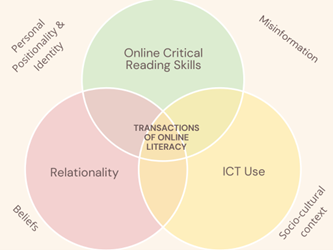
By
Joe Stouffer, Matteo DiMuro, Zahra Kasamali, Michelle Lam, and Ellen Watson
September 2022
Print Version
What you need to know
The Covid-19 pandemic has exacerbated the deep and painful impacts of confrontational interactions because of living in the post-truth era, such as severed relationships and increasing distance between groups of people. To explore this connection between relationality and online literacy, we situate our discussion within a framework that views online critical reading skills, relational contexts, Information and Communications Technology (ICT), and social media use as intersecting, transactional elements (see Figure). A backdrop of individual personal beliefs, social-cultural contexts, personal positionality and identities, and misinformation grounds our consideration of influences on readers’ choices.
Why this research is important
Bringing together relationality, online critical reading skills, ICT, and social media use is a unique approach, as fields of study tend to focus on one or two of these. However, the intersectional consideration of all three is important. Our relationships impact what we believe, how some social media algorithms deliver us information, and how we form allegiances. Thus, our focus needs to include knowledge about what constitutes misinformation, literacy skills to critically analyze what we (and our students) read, acknowledgment of relationality, and an understanding of the social practices that form dynamically within and around these spheres of influence.
How this research was conducted
We conducted a study with pre-and in-service teachers aimed at examining the relational impacts of misinformation. After a brief presentation of SIFT (Stop, Investigate, Find Resources, Trace Claims)—a lateral reading method used to evaluate online information—we used focus group conversations (N=18) and an anonymous survey (N=16) to gather responses to questions about the intersections of digital misinformation and relational ties.
What the researchers found
In our preliminary thematic analysis, we noted that students were carrying relational stress in their personal lives, where relationships and disagreements were viewed as a source of anxiety that they sought to avoid, instead of the relationships around them being a source of strength and encouragement during difficult times. Additionally, many students had already cut ties over differences of opinions.
In an age of misinformation, we argue that these online literacy transactions are becoming increasingly confrontational, emotionally driven, and complex to navigate and participate in while honouring care for self and others. There are many interrelated and compounding factors that dictate how someone may interact online. The way someone relates with others online is not only based on whether they think something is true but can be connected to their web of relations and the connections to those with whom they interact.
How this research can be used
While we identify a need for critical literacy skills, ICT skills, and relational ethics, what does this mean in a classroom? Within this kind of ethos, we must be able to prepare students to engage with difficult knowledge and disagreements in ways that honour their relational contexts while at the same time building their ICT and online critical reading skills. Simply put, we must provide our students with the skills to navigate complexity with more options than routine avoidance or terminating relationships.
About the Researchers
Keywords
- critical reading
- digital literacy
- education
- ICT
- misinformation
- online literacy
- relationality
Editor: Christiane Ramsey
Read more BU Research
Research at Brandon University follows comprehensive policies designed to safeguard ethics, to ensure academic integrity, to protect human and animal welfare and to prevent conflicts of interest.





